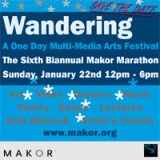Your own engagement with the problems of the United States is fraught with suspicion -- as a non-American, and as a playwright, the target of your criticism is not your own community. Granted, as the United States acts by its own warrant on the global stage it becomes, despite all efforts and many fervent hopes, a global problem. However, your choice of outward-turning critique leaves you stuck in the realm of the political language (which you decry), championing the revelation of falsehood in the very manner in which it is usually pronounced.
 I have no doubt that previous Nobel Laureates in literature could have had a beneficial effect on world events through their speeches. Perhaps in the period leading up to the Second World War and the Nazi Holocaust some of the prize winners could have prevented the coming mass bloodshed and genocide resulting from the heinous but explicit aims of Nazism. Roger Martin du Gard could have been more forceful in his 1937 acceptance speech than speculating that he won the prize because his books “appeared to defend certain values that are again being threatened and to fight against the evil contagion of the forces of war.” Despite the politeness of his reference Martin du Gard at least noted the political context of his prize – which is more than any other literature laureate did in the Hitler era. Given these counter-examples it is important that you chose to state the position of the truth into which you “stumble.”
I have no doubt that previous Nobel Laureates in literature could have had a beneficial effect on world events through their speeches. Perhaps in the period leading up to the Second World War and the Nazi Holocaust some of the prize winners could have prevented the coming mass bloodshed and genocide resulting from the heinous but explicit aims of Nazism. Roger Martin du Gard could have been more forceful in his 1937 acceptance speech than speculating that he won the prize because his books “appeared to defend certain values that are again being threatened and to fight against the evil contagion of the forces of war.” Despite the politeness of his reference Martin du Gard at least noted the political context of his prize – which is more than any other literature laureate did in the Hitler era. Given these counter-examples it is important that you chose to state the position of the truth into which you “stumble.”
We, however, live in a different era. Political actors and constituencies have learnt too much from art and entertainment to be swayed by “mere” intellectual or ideological criticism, and political audiences are unimpressed by strident claims that threaten their worldview. The justification for these claims often seems to come from their power – might makes right. But, insofar as you are the international prize winner, and the ultimate power in your speech, you have also claimed ex officio authority and wielded your fist (albeit around a pen) to mark your own statements as the 'truth.' Although you claim to give respect to your characters and allow them to flesh themselves out, you seem to approach this speech with preconceived ideas that make the claim to be stumbling “towards the truth in the dark” seem disingenuous. Your introduction, and explanation of the limits of political language and political satire shape our reception of your own political language and satire at the closing of your lecture. Your critique of the disjunction between the enlightened rhetoric of the United States and its “might is right” Realpolitik is not new; it comes with no alternative solution; it suggests no new insights into the nature of consumer entertainment democracies.
 By way of conclusion, I return to the Freud of Moses and Monotheism, who, despite having lived in a radically oppressive situation – a situation that oppressed specifically his own people – nonetheless chose to look inward and make his internal analysis his response to the outward situation. This, clearly, involves problems, but it has the virtue of giving Freud standing in the matter. Rather than pointing fingers, Freud addresses a non-Jewish problem (ethnic essentialism and power politics) from within his Jewish particularity. He does not divide discourses into discrete realms -- subtle and artistic here, brutish and political there -- but rather, through his "historical novel" point at how they might profitably be combined.
By way of conclusion, I return to the Freud of Moses and Monotheism, who, despite having lived in a radically oppressive situation – a situation that oppressed specifically his own people – nonetheless chose to look inward and make his internal analysis his response to the outward situation. This, clearly, involves problems, but it has the virtue of giving Freud standing in the matter. Rather than pointing fingers, Freud addresses a non-Jewish problem (ethnic essentialism and power politics) from within his Jewish particularity. He does not divide discourses into discrete realms -- subtle and artistic here, brutish and political there -- but rather, through his "historical novel" point at how they might profitably be combined.
By the end of his life, Freud knew that Moses was probably not an Egyptian. However, his self-conscious articulation of the history of the Jews still performs and displays a radical and open alternative attitude to the prevailing social and political analyses of his time. He complicates history and identity from a point of utter vulnerability at a time when the nations of Europe were fighting over nominally essential truths. Moreover, he does so in a genre that begs for art-critical reception, thus combining and confusing art, history, and politics as they share a pursuit of the truth. What his novel and your lecture do show, though, is that there is no alternative for us but to trust in art and artistic truths -- precisely when they are translated into the political realm, for if we pull back from articulating our own artistic truths, those of patriotic propaganda, equally aesthetic but far more dangerous, will prevail. If we do not hold those who represent us to the standards of writers – “highly vulnerable, almost naked… open to all the winds” – then they will lie and become politicians.
Yours respectfully,
Dan Friedman

An unlikely hero for an unlikely time
November, 2005
June, 2005
What to make of the recent spate of Jewish theater productions?
April, 2005
Should liberals compromise their ideals in order to remain relevant?
January, 2005
Artists on 9/11 and the war on/of terror
October, 2004
A debate between the author of "A Jewish Critique of Bushism" and the head of "L.A. for Bush"
October, 2004
Reading Toqueville in an Election Year
April, 2004
Toward a postmodern Judaism
August, 2003
The ambiguities of art and life
March, 2003
The Art of the Press Conference
September, 2002
A review of "The Paradise Institute," a meditation on frames, judgment,
and power.
May, 2002



A Parable after my hard drive crashed
Zalman Schachter-Shalomi
Christmas in Jerusalem
Jay Michaelson
Carobs
Elisha Porat
Dear Mr. Pinter
Dan Friedman
The Nuclear Physicist Gives his Son a Haircut
Hanan Harchol
Brodsky Begins, Part Two
Adam Mansbach
Archive
Our 870 Back Pages
Zeek in Print
Subscribe now!

About Zeek
Mailing List
Contact Us
Subscribe
Tech Support
Links

From previous issues:
Skepticism Does Not Exist
Treasure
Driving
Jay Michaelson
Ron Mohring
Julia Glassman
 Email us your comments
Email us your comments